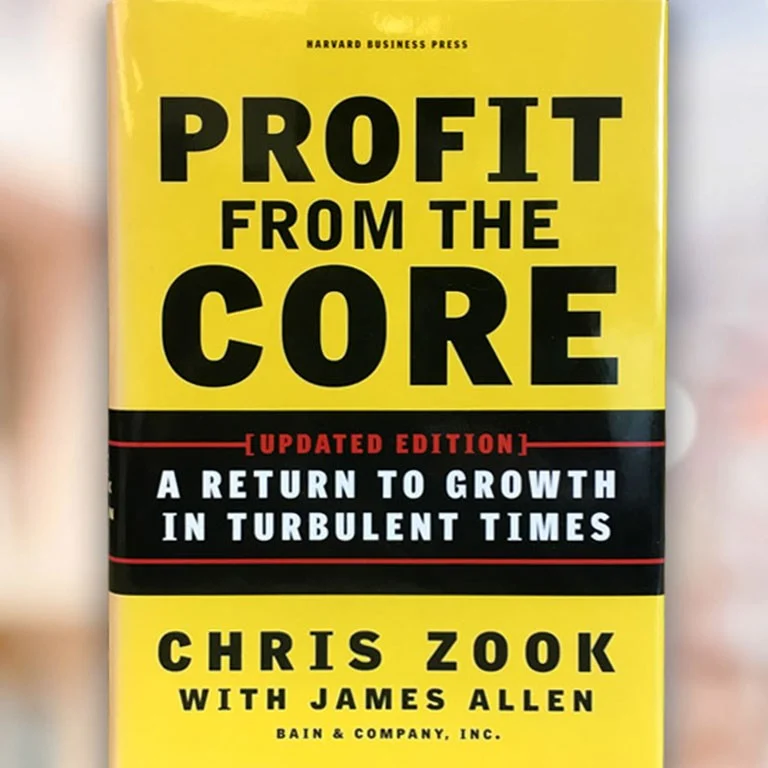Article
A new study from Bain & Company argues that companies need to focus on their core business to deliver sustained growth and profitability.
Over the past decade's unprecedented and uninterrupted economic boom, 90% of all companies failed to achieve even modest sustained growth rates, falling short of shareholder expectations, according to a new study conducted by Bain & Company, a global strategy consulting firm. Now that economic conditions have become more ominous, this dire statistic sends a clear message to chief executives and shareholders: the odds of a company growing profitably, or making successful strategic growth decisions, are low.
The study is captured in Profit from the Core: Growth strategies in an era of turbulence, co-authored by Chris Zook, Bain's worldwide strategy director, and published by Harvard Business School Press earlier this year. At the heart of the study is the concept of a "sustained value creator" (SVC). This is defined by Bain as a company that has maintained an average annual inflation-adjusted growth rate in both earnings and revenue of at least 5.5% over ten years. SVC companies also have had to earn their cost of equity, meaning the total return on the stock had to exceed what an investor could have earned by putting the same money in long-term government bonds. In studying the handful of companies that managed to qualify as SVCs, Bain concluded that 85% of them shared one major characteristic: they concentrated on a well-defined, core business—and not on the "next new thing"—in growing their business.
This history of success has positioned SVC companies to weather current unsettled economic conditions, Bain argues. The stock price performance of 173 SVC companies in the US has continued, in the aggregate, to outperform the stockmarket over the past 18, 12 and six months. Over the past year they have done better on average by 8% than the S&P, and by much more as compared with the NASDAQ or bonds.
Internet companies have missed out by failing to define a core business, Bain argues. Less than 2% of 1,500 "pure" Internet companies funded between 1994 and 2001 can claim to have achieved sustained, profitable growth over a three-year period. Only 10% of "pure" publicly funded Internet companies boast a strong core business, yet this small group accounts for 80% of the total market value of all the companies in this segment.
"The Internet data magnify the need for companies to prove the existence of a profitable core before getting trapped in a sea of profitless prosperity," commented Mr Zook. "It is remarkable that so many Internet companies piled layer upon layer of growth initiatives on their core business before it had been stabilised or profitable."
Profit from the core argues that most growth strategies fail to deliver value—or can even destroy it—primarily because they wrongly diversify from the core business. Drawing on an extensive database of over 1,800 companies, case studies and interviews, the authors criticise what they see as a one-size-fits-all approach to strategy, and advocate instead a back-to-basics approach. They urge strategic planners to view a well-defined core business as a key source of competitive advantage, and the most viable platform for successful expansion. Focus can liberate, argues Mr Zook. Honing back to a company's core activity can unleash resources for sustainable growth, whereas erroneously defining the core business or blurring its boundaries can lead to fatal mistakes.
Based on an analysis of the 10% of companies that actually created value for shareholders, including Home Depot and Harley Davidson, Profit from the Core contends that defining the core is the single most important issue for any company that wants to grow profitably. By investing time and resources in understanding which of their products, customer segments and technologies deliver the best results, executives can identify their company's true basis of competitive advantage. Having properly defined the core business, a firm can further identify the sources of differentiation that will continue to create market power, as well as explore new business opportunities related to the core.
Companies need not remain chained to their core business forever,
however. Industry turbulence, such as an economic slowdown, technology changes and shifts in customer behaviour, can damage a company's core business. Even market leaders risk losing valuable market share in turbulent times. Such turbulence may force companies to leap-frog outside their core businesses and redefine themselves, and Bain points to Enron, Charles Schwab and Corning as among the rare success stories in such redefinition.

Profit from the Core
Learn more about how companies can return to growth in turbulent times.